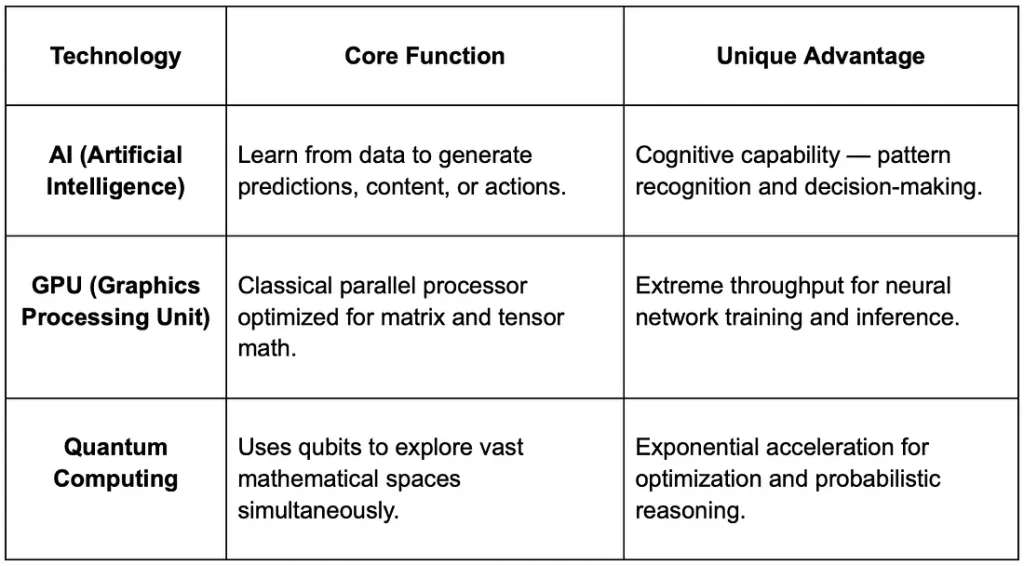…and why we believe it will reduce rate of buildout of data centers and electricity generation.
AI’s core function is the use of mathematical models (neural networks, probabilistic systems) to learn from data and make predictions or decisions which allows pattern recognition, generative modeling, and decision-making.
However, modern AI implementation is constrained by energy and hardware limits. Training and mostly running large language models consumes massive electricity, with “energy per token generated” becoming a new efficiency bottleneck.
- GPUs remain unmatched for dense parallel arithmetic and matrix operations, but their energy use rises almost linearly with model scale.
- Quantum Computing offers a potential escape from this curve: by representing and transforming information using quantum states, it can perform complex optimization or sampling tasks exponentially faster than GPUs and using far less power.
Together, AI, GPU’s and Quantum Computing form a hybrid compute stack that combines the intelligence of AI, the brute-force acceleration of GPUs, and the energy-efficient optimization of quantum systems.
Three Technologies, One Computational Frontier

In practice:
- GPUs will handle numerical workloads (matrix multiplications, embeddings, attention layers).
- Quantum co-processors will handle optimization, search, and probabilistic inference that are computationally expensive on GPUs.
- AI orchestrates the overall workflow, distributing tasks to whichever hardware minimizes energy per token or per inference.
How does this take place? Well, across each domain, there is a combination of these technologies:
- Energy-Aware AI Hybrid Scheduling: Quantum algorithms dynamically allocate GPU clusters to minimize energy use and compute footprint for both training and inference.
- Large-Scale Inference: GPUs execute forward passes efficiently; quantum units assist in minimizing computation paths.
- Quantum-Enhanced Reinforcement Learning: Agents use quantum solvers to explore policies more efficiently.
The Strategic Challenge: Reducing Energy per Token
As AI scales, each token produced by large models carries a measurable energy cost (and datacenter costs).
The only sustainable path forward involves combining GPU compute density with quantum efficiency:
- GPUs: the engines of today’s AI.
- Quantum: the optimizer of tomorrow’s compute economy.
- AI: the intelligence layer that binds them together.
When does this all become commercial?
Over the next 2–5 years commercial Quantum Accelerators emerge with AI workloads offloading parts of training/inference to quantum co-processors. By the early 30’s end-to-end pipelines (data → quantum feature mapping → AI model → decision) will become standard in computing.
Some of the applications will include:
- Drug Discovery & Materials Science: AI predicts candidate molecules (GPUs accelerate both AI and simulation) and quantum computers simulate quantum chemistry.
- Optimization & Logistics: Quantum solves combinatorial optimization (e.g., routing, scheduling); AI interprets patterns with GPUs handling massive training datasets.
- Finance & Risk Modeling: AI models trends and risks (eg Monte Carlo simulations); quantum systems explore portfolio optimizations.
- Cybersecurity & Cryptography: Quantum threatens current encryption (and creates new type of encryption) while AI using GPU’s will be used for intrusion detection and cryptographic algorithm design.
Entrée Capital has been following this space closely, and developed a highly technical and qualified practise in the area — we compiled a list of applications here that you can read through (https://entreecap.com/wp-content/uploads/2025/03/Quantum-Computing-Real-World-Use-Cases.pdf)
In conclusion, we believe that quantum computing is a powerful new computing platform that is fundamentally changing aspects of computing, and that it’s happening now (i.e. in the next 3 years). This will reduce the long term rate of build out of GPU datacenters and requirement for substantial new electricity generation, and thus contrary to what many are predicting. We also believe that like all hype cycles, some assets will no doubt be very overvalued in the quantum space, but that as commercialization sets in, so too valuations will adjust.




